BROKEN ARROW, 20th Century Fox, 1950.
Dir. Delmer Daves, Perf. James Stewart, Jeff Chandler, and Debra Paget.
Review by Dominic
Largely exchanging carnage between settlers and Native Americans for conversation, Delmer Daves’s Broken Arrow has aged gracefully in its treatment of race relations where so many of its contemporaries appear (their other merits aside) offensively grizzled.
Riding across the desert to Tucson, level-headed prospector Tom Jeffords (Stewart) encounters a dying Apache boy, and, rather than partake in the ten-year war between the Apache and the Tucson settlers by killing him, nurses him to recovery. Later, having learned the rudiments of Apache language and custom, Jeffords negotiates with their leader, Cochise (Chandler), to allow mail-carriers to pass through the area unharmed as a first step toward peace. Jefford’s openness to discussion with their antagonists, however, leaves the Tucson townsfolk suspicious of him, and his loyalty is aggressively questioned in the face of ongoing settler casualties in the conflict with the Natives.
Daves’s film is too long on talk and too short on action to appeal to all viewers, but has a great deal to offer through its implication that there might be as much intrigue in Native Americans and settlers exploring each other’s culture as killing each other. Broken Arrow eschews mythic conceptualizations of settlement that justified violence against the Natives, and even though the majority of the Indians are played by white actors, they are admirably and diversely represented. While the film is still narrated from a white perspective, it affords its Native American characters real humanity, and resists the urge to tokenistically flatter their culture by over-romanticizing it.
Unlike many Westerns, in Broken Arrow the Natives neither exist nor act as a simple, homogenous group, and winning the favor of one Indian does not ensure the favor of all of them. Through a High Noon-like scene in which his fellow tribesmen abandon Cochise, the film demonstrates that Indian politics are as complicated as those of the settler societies. Somewhat less convincing is a run-of-the-mill love story involving Jeffords and an Indian maiden, which serves to unnecessarily emphasize cultural conflict and Jeffords’s position between worlds.
Stewart’s performance is typically strong, although without the psychological edginess of his greatest Western roles. The film is also retrospectively narrated by his character, although this seems unnecessary and overrides our engagement with his performance on-screen. This is not the only way in which dialogue troubles Daves’s film. We are informed early on that the story presented is true but that in this enactment the Indians will speak in English. While the viewer may be willing to suspend disbelief here, the film itself seems unsure of the validity of this move and the initial dialogue between Native and settler is awkwardly self-conscious.
Broken Arrow’s conclusion is dramatically flatter than expected, but remains challenging in its refusal to provide excitement by leaning back on straight-forward hero/villain roles. Even more challenging is its simple yet powerful assertion that past wrongs must sometimes be accepted rather than avenged if progress is to occur.
All reviews -
Movies (109)
broken arrow
 Posted : 13 years, 6 months ago on 28 November 2011 04:08
(A review of Broken Arrow (1952))
Posted : 13 years, 6 months ago on 28 November 2011 04:08
(A review of Broken Arrow (1952)) 0 comments, Reply to this entry
0 comments, Reply to this entry
the magnificent seven
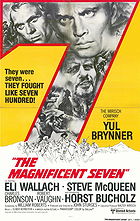 Posted : 13 years, 6 months ago on 28 November 2011 04:02
(A review of The Magnificent Seven)
Posted : 13 years, 6 months ago on 28 November 2011 04:02
(A review of The Magnificent Seven)THE MAGNIFICENT SEVEN, MGM, 1960.
Dir. John Sturges. Perf. Yul Brynner, Eli Wallach, Steve McQueen, Robert Vaughn, James Coburn, Charles Bronson, Brad Dexter, Horst Buchholz.
Review by Samu Rahn
It is uncommon for a film to succeed when it tries to be many different things at once. In The Magnificent Seven, classic Western vistas and iconic heroes are melded with a Japanese plot structure and underlying ideology, whimsical humor is tempered by abrupt violence, and a charming moral of altruism is shot down, literally, by the realistic misgiving of selfishness.
The cast is a dream team of 60s real men, led by Eli Wallach as the bandito Calvera and Steve McQueen and Yul Brynner as the gunslingers who head up the resistance party. With a supporting cast that includes James Coburn, Charles Bronson, and Robert Vaughn, it would have been frightfully easy (and no doubt more lucrative at first) if the direction had simply made each character a poster-boy cutout of the actor who played him. Even though a number of these actors, McQueen included, had yet to leave a serious mark on cinema history, their personalities and faces were striking enough for the poster-boy approach to have been viable. But then, The Magnificent Seven might just have been a lesser presage of Ocean’s Eleven (2001) or Ocean’s Twelve (2004), more specifically: rich characters whose development is ignored in favor of the actors’ own egoism and panache. Such a film would have been banal, and the climactic gunfight, where most of the seven meet their ends, would have seemed like coy theater antics.
Instead, director John Sturges uses a trenchant script, largely written by the uncredited Walter Newman, to unearth each character’s heart with a few swift lines. These nuggets of discovery, either of the self or of each other, are embedded within the plot, allowing the characters to grow into the narrative rather than alongside of it. In this way, the climax of the film is justifiable to the audience and compelling, as each character becomes fully defined. Some by how they embrace their survival, others by how they meet their death.
Through its first few acts, though, The Magnificent Seven progresses in an almost lackadaisical manner, as if the imminent gunfight with Calvera is nothing more than a backyard scuffle between cowboys and Indians before supper. Elmer Bernstein’s iconic score is largely responsible for supporting the uplifting mood that carries the majority of the film, giving each character’s story a flavour of high adventure and entertainment. The scenes of weapons training, scouting missions, and occasional scenes of pure dialogue are mostly upbeat, recalling another McQueen film yet to be made, The Great Escape (1963), in how dire circumstances can be lightly cast. This, aside from making The Magnificent Seven simply more fun to watch, also preserves an audience’s energy for the unexpectedly cutting climax and a final note of poignant stoicism.
After all, this Western is neither drama nor comedy, but rather at a lonely point in between where the humor is wry, the pathos swift, and the icons everlasting. While The Magnificent Seven is not the most groundbreaking or influential Western ever made, its qualities may certainly make it the most timeless.
Dir. John Sturges. Perf. Yul Brynner, Eli Wallach, Steve McQueen, Robert Vaughn, James Coburn, Charles Bronson, Brad Dexter, Horst Buchholz.
Review by Samu Rahn
It is uncommon for a film to succeed when it tries to be many different things at once. In The Magnificent Seven, classic Western vistas and iconic heroes are melded with a Japanese plot structure and underlying ideology, whimsical humor is tempered by abrupt violence, and a charming moral of altruism is shot down, literally, by the realistic misgiving of selfishness.
The cast is a dream team of 60s real men, led by Eli Wallach as the bandito Calvera and Steve McQueen and Yul Brynner as the gunslingers who head up the resistance party. With a supporting cast that includes James Coburn, Charles Bronson, and Robert Vaughn, it would have been frightfully easy (and no doubt more lucrative at first) if the direction had simply made each character a poster-boy cutout of the actor who played him. Even though a number of these actors, McQueen included, had yet to leave a serious mark on cinema history, their personalities and faces were striking enough for the poster-boy approach to have been viable. But then, The Magnificent Seven might just have been a lesser presage of Ocean’s Eleven (2001) or Ocean’s Twelve (2004), more specifically: rich characters whose development is ignored in favor of the actors’ own egoism and panache. Such a film would have been banal, and the climactic gunfight, where most of the seven meet their ends, would have seemed like coy theater antics.
Instead, director John Sturges uses a trenchant script, largely written by the uncredited Walter Newman, to unearth each character’s heart with a few swift lines. These nuggets of discovery, either of the self or of each other, are embedded within the plot, allowing the characters to grow into the narrative rather than alongside of it. In this way, the climax of the film is justifiable to the audience and compelling, as each character becomes fully defined. Some by how they embrace their survival, others by how they meet their death.
Through its first few acts, though, The Magnificent Seven progresses in an almost lackadaisical manner, as if the imminent gunfight with Calvera is nothing more than a backyard scuffle between cowboys and Indians before supper. Elmer Bernstein’s iconic score is largely responsible for supporting the uplifting mood that carries the majority of the film, giving each character’s story a flavour of high adventure and entertainment. The scenes of weapons training, scouting missions, and occasional scenes of pure dialogue are mostly upbeat, recalling another McQueen film yet to be made, The Great Escape (1963), in how dire circumstances can be lightly cast. This, aside from making The Magnificent Seven simply more fun to watch, also preserves an audience’s energy for the unexpectedly cutting climax and a final note of poignant stoicism.
After all, this Western is neither drama nor comedy, but rather at a lonely point in between where the humor is wry, the pathos swift, and the icons everlasting. While The Magnificent Seven is not the most groundbreaking or influential Western ever made, its qualities may certainly make it the most timeless.
 0 comments, Reply to this entry
0 comments, Reply to this entry
Around the World in 80 Days (1956) review
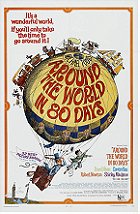 Posted : 13 years, 6 months ago on 27 November 2011 12:47
(A review of Around the World in 80 Days (1956))
Posted : 13 years, 6 months ago on 27 November 2011 12:47
(A review of Around the World in 80 Days (1956))Razzle-dazzle showman Michael Todd hocked everything he had to make this spectacular presentation of Jules Verne's 1872 novel Around the World in 80 Days, the second film to be lensed in the wide-screen Todd-AO production. Nearly as fascinating as the finished product are the many in-production anecdotes concerning Todd's efforts to pull the wool over the eyes of local authorities in order to cadge the film's round-the-world location shots--not to mention the wheeling and dealing to convince over forty top celebrities to appear in cameo roles. David Niven heads the huge cast as ultra-precise, supremely punctual Phileas Fogg, who places a 20,000-pound wager with several fellow members of London Reform Club, insisting that he can go around the world in eighty days (this, remember, is 1872). Together with his resourceful valet Passepartout (Cantinflas), Fogg sets out on his world-girdling journey from Paris via balloon. Meanwhile, suspicion grows that Fogg has stolen his 20,000 pounds from Bank of England. Diligent Inspector Fix (Robert Newton) is sent out by the bank's president (Robert Morley) to bring Fogg to justice. Hopscotching around the globe, Fogg pauses in Spain, where Passepartout engages in a comic bullfight (a specialty of Cantinflas). In India, Fogg and Passepartout rescue young widow Princess Aouda (Shirley MacLaine, in her third film) from being forced into committing suicide so that she may join her late husband. The threesome visit Hong Kong, Japan, San Francisco, and the Wild West. Only hours short of winning his wager, Fogg is arrested by the diligent Inspector Fixx. Though exonerated of the bank robbery charges, he has lost everything--except the love of the winsome Aouda. But salvation is at hand when Passepartout discovers that, by crossing the International Date Line, there's still time to reach the Reform Club. Will they make it? See for yourself. Among the film's 46 guest stars, the most memorable include Marlene Dietrich, Charles Boyer, Jose Greco, Frank Sinatra, Peter Lorre, Red Skelton, Buster Keaton, John Mills, and Beatrice Lillie. All were paid in barter--Ronald Colman did his brief bit for a new car. Newscaster Edward R. Murrow provides opening narration, and there's a tantalizing clip from Georges Méliès' A Trip to the Moon (1902). Offering a little something for everyone, Around the World in 80 Days is nothing less than an extravaganza, and it won 5 Oscars, including Best Picture and Best Cinematography.
 0 comments, Reply to this entry
0 comments, Reply to this entry
Genghis Khan review
 Posted : 13 years, 6 months ago on 27 November 2011 12:46
(A review of Genghis Khan)
Posted : 13 years, 6 months ago on 27 November 2011 12:46
(A review of Genghis Khan)I. too, have searched for this movie that has impacted my life and love for historical films. I was taken to see this when it came out in 1965 on the big screen. I was 12 yrs. old. The raw action, beautiful cinematography,and the variety of human emotions and situations that inspired each character to their full potential literally burst off the screen. I would be willing to pay the price to have this in my dvd collection. Please, please, help myself and others to get this relased and please play it on your show. thank you.
 0 comments, Reply to this entry
0 comments, Reply to this entry
Mackenna's Gold review
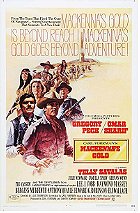 Posted : 13 years, 6 months ago on 27 November 2011 12:43
(A review of Mackenna's Gold)
Posted : 13 years, 6 months ago on 27 November 2011 12:43
(A review of Mackenna's Gold)Mackenna's Gold is a colorful, action-packed western feature with an all-star cast. Mackenna (Gregory Peck) has committed to memory the map that leads to some hidden Apache gold. The Indians now want the gold to finance their fight against the white men who invade their territory. Mexican bandit Colorado (Omar Sharif) wants the gold for himself, and the local preacher (Raymond Massey) and the editor of the newspaper (Lee J. Cobb) also get gold fever. Burgess Meredith plays the storekeeper and Edward G. Robinson is long-time town resident Old Adams. Everyone goes looking for the hidden treasure as the Indians dwindle their numbers with violent attacks. The search is monitored by U.S. calvary Sergeant Tibbs (Telly Savalas). Colorado captures Mackenna to lead him to the gold as death comes to those who show the most avarice. Music is provided by Quincy Jones.
 0 comments, Reply to this entry
0 comments, Reply to this entry
Mutiny on the Bounty review
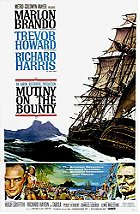 Posted : 13 years, 6 months ago on 27 November 2011 12:41
(A review of Mutiny on the Bounty)
Posted : 13 years, 6 months ago on 27 November 2011 12:41
(A review of Mutiny on the Bounty)This colorful remake of the 1935 version again concerns the crew and treatment of the HMS Bounty by a cold hearted sadistic captain. Captain Bligh (Trevor Howard) boards the ship in Portsmouth, England, to embark on a mission to bring tropical breadfruit trees to Jamaica. Fletcher Christian (Marlon Brando) is the aristocratic second mate who welcomes the new captain aboard. Christian's view of the captain sours with the cruel treatment of the crew and the dangerous decision to round Cape Horn. The Bounty sails into the teeth of a ferocious winter storm which is another in a long line of indignities suffered on the journey. John Mills (Richard Harris) is punished for stealing cheese. A sailor is ordered to stay aloft in the crow's nest, nearly resulting in death. The crew finds temporary paradise in Tahiti before Bligh's behavior becomes intolerable for the once faithful Christian. The crew revolts and sends the captain on his way in a small rowboat. Settling on Pitcairn Island, the crew soon realizes they may never see England again. Mills burns the ship to insure the trip is never made. Christian attempts to save the only means of transportation of their new island home. Lewis Milestone directed the film which was plagued by constant cost overruns to the tune of 18 million dollars. Brando's legendary ego clashed with results as turbulent as the fictitious trip around stormy Cape Horn. The movie retained slightly over half the cost of the production price tag in its initial release
 0 comments, Reply to this entry
0 comments, Reply to this entry
butch cassidy
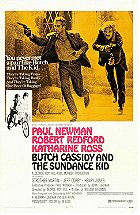 Posted : 13 years, 6 months ago on 25 November 2011 06:07
(A review of Butch Cassidy and the Sundance Kid)
Posted : 13 years, 6 months ago on 25 November 2011 06:07
(A review of Butch Cassidy and the Sundance Kid)Opening with a silent "movie" of Butch Cassidy's Hole in the Wall Gang, George Roy Hill's comically elegiac Western chronicles the mostly true tale of the outlaws' last months. Witty pals Butch (Paul Newman) and Sundance (Robert Redford) join the Gang in successfully robbing yet another train with their trademark non-lethal style. After the pair rests at the home of Sundance's schoolmarm girlfriend, Etta (Katharine Ross), the Gang robs the same train, but this time, the railroad boss has hired the best trackers in the business to foil the crime. After being tailed over rocks and a river gorge by guys that they can barely identify save for a white hat, Butch and Sundance decide that maybe it's time to try their luck in Bolivia. Taking Etta with them, they live high on ill-gotten Bolivian gains, but Etta leaves after their white-hatted nemesis portentously arrives. Their luck running out, Butch and Sundance are soon holed up in a barn surrounded by scores of Bolivian soldiers who are waiting for the pair to make one last run for it.
 0 comments, Reply to this entry
0 comments, Reply to this entry
a perfect
 Posted : 13 years, 6 months ago on 25 November 2011 06:05
(A review of A Perfect World)
Posted : 13 years, 6 months ago on 25 November 2011 06:05
(A review of A Perfect World)Clint Eastwood, hot off of his Academy Award win for Unforgiven, directed this small character study, appearing in the guise of a cops-and-robbers action picture. The film takes place during the fall of 1963. Eight-year old Phillip Perry (T.J. Lowther), the son of a devout Jehovah's Witness mother, is staying home while all the other children are out trick-or-treating. But then prison escapee Butch Haynes (Kevin Costner) appears in his kitchen. Needing a hostage to aid him in his escape from jail, he grabs Phillip. Phillip curiously looks up to Butch and willingly accompanies him. Butch gets rid of his fellow escapee after he tries to molest the child, and Butch and Phillip take to the Texas highway, on the run from the cops. The cop in pursuit in this instance is Police Chief Red Garnett (Clint Eastwood), riding in his sleek Populux Airglide trailer -- his "mobile command headquarters." On the road with Garnett is Sally Gerber (Laura Dern), a pushy pre-feminist criminologist, along with a creepy federal agent who is an expert sharpshooter. Butch is not particularly anxious to make it to the Texas borderline, and neither is Garnett in any particular hurry to catch Butch. As Butch and Phillip form a father-son attachment, the paths of Butch and Garnett gradually come together, in time for a final confrontation, after which Garnett confesses, "I don't know nothing. I don't know a damn thing.
 0 comments, Reply to this entry
0 comments, Reply to this entry
the wooden horse
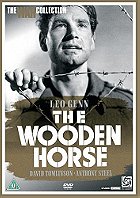 Posted : 13 years, 6 months ago on 24 November 2011 06:12
(A review of The Wooden Horse)
Posted : 13 years, 6 months ago on 24 November 2011 06:12
(A review of The Wooden Horse)I've been buying from The Wooden Horse since they were located in Old Town (1976 for those that are counting).
What I love is the wall by the stuffed toys has lots of cool but inexpensive items like marbles, bouncy balls, and bubbles for kids wanting to spend their allowance.
I bought my one marionette there...where else are you going to find a hand crafted honest to goodness marionette??? (snake charmer...I used my birthday money when I was in 6th grade & still have it to this day)
What I love are all the arts and crafts items as well as science kits and unique games.
They have always been great to my daughter. When she buys something with her money, there has never been any problem with her handling her own transaction...even when she was 5 or 6 and bought some pretty rocks.
They're a great place for buying birthday and Christmas presents since they do wrap with a large variety of paper, and will custom make the bows out of yarn.
There is a separate room for dolls (including little kitty dolls with wooden furniture) and dress up clothes, a section for musical instruments, a section for Legos, a section for Brio, a large section for the under 18 mos crowd.
Say your friend or cousin or whatever had a kid and you had NO IDEA what to get them. Go to the Wooden Horse. I saw the manager spend 10 minutes with a woman going over all the different infant toys to help her find something.
Most of all, go and enjoy being a kid again.
What I love is the wall by the stuffed toys has lots of cool but inexpensive items like marbles, bouncy balls, and bubbles for kids wanting to spend their allowance.
I bought my one marionette there...where else are you going to find a hand crafted honest to goodness marionette??? (snake charmer...I used my birthday money when I was in 6th grade & still have it to this day)
What I love are all the arts and crafts items as well as science kits and unique games.
They have always been great to my daughter. When she buys something with her money, there has never been any problem with her handling her own transaction...even when she was 5 or 6 and bought some pretty rocks.
They're a great place for buying birthday and Christmas presents since they do wrap with a large variety of paper, and will custom make the bows out of yarn.
There is a separate room for dolls (including little kitty dolls with wooden furniture) and dress up clothes, a section for musical instruments, a section for Legos, a section for Brio, a large section for the under 18 mos crowd.
Say your friend or cousin or whatever had a kid and you had NO IDEA what to get them. Go to the Wooden Horse. I saw the manager spend 10 minutes with a woman going over all the different infant toys to help her find something.
Most of all, go and enjoy being a kid again.
 0 comments, Reply to this entry
0 comments, Reply to this entry
brute
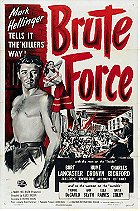 Posted : 13 years, 6 months ago on 24 November 2011 06:10
(A review of Brute Force)
Posted : 13 years, 6 months ago on 24 November 2011 06:10
(A review of Brute Force)Burt Lancaster had one of his first starring roles in this hard-hitting prison drama. Capt. Munsey (Hume Cronyn) is a cruel, corrupt prison guard who has his own less-than-ethical ways of dealing with inmates, enough so that Joe Collins (Lancaster) -- the toughest inmate in the cell block -- has decided to break out. Collins tries to persuade Gallagher (Charles Bickford), the unofficial leader of the inmates and editor of the prison newspaper, to join him, but Gallagher thinks Collins' plan won't work. However, Collins does have the support of his cellmates, most of whom, like himself, wandered into a life of crime thanks to love and good intentions. Tom Lister (Whit Bissell) was an accountant who altered the books so he could buy his wife a mink coat. Soldier (Howard Duff) fell in love with an Italian girl during World War II and took the rap for her when she murdered her father. Collins pulled a bank job to raise money to pay for an operation that could possibly get his girl out of a wheelchair. And Spencer (John Hoyt) made the mistake of getting involved with a female con artist. After Munsey drives Tom to suicide and prevents Gallagher from obtaining parole, Gallagher joins up with Collins and his men in the escape attempt. Director Jules Dassin would next direct the influential noir drama The Naked City; six years later, he would move to Europe after political blacklisting prevented him from continuing to work in the United States
 0 comments, Reply to this entry
0 comments, Reply to this entry
 Login
Login
 Home
Home 93 Lists
93 Lists 109 Reviews
109 Reviews Collections
Collections